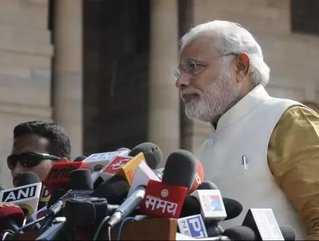Will India open up once and for all to foreign investment?

India’s Finance Minister Arun Jaitley is finishing up a nine-day tour of the United States, during which he wooed U.S. investors to spend their money in India.
This move comes after “India’s benchmark stock index, the S&P BSE Sensex, which surged 30 percent last year, is down 1.4 percent so far this year, making India one of the worst-performing major Asian markets. Foreign institutional investors have pulled nearly $2 billion from Indian stocks since late April,” reports the Wall Street Journal (WSJ).
Evidently bleeding, Indian Prime Minister Narendra Modi dispatched Jaitley to the U.S. to reassure investors that their money is safe in India.
This is not the way things were supposed to be. Modi, who was recently elected, ran on a platform to reinvigorate economic growth in India. Once he was elected, investor excitement about the coming opportunities in India reached a fever pitch, contributing to the excellent performance of the S&P BSE Sensex. India being a democracy, though, and complex one at that, has not enjoyed the type of political atmosphere friendly to the revolutionary economic reforms—think recent Mexican energy reforms—it needs to pass in order for Modi to fulfill his economic campaign visions.
In other words, Modi and company have failed to deliver. Telling from Jaitley’s visit to the U.S., however, he is not ready to give up and may be more determined than ever to do it. In retrospect, it has only been a little bit over a year since his election and his political tasks are no walk in the park. Judging from Jaitley’s ambitious and busy agenda on his tour of the U.S., Modi fully intends to create the business paradise he promised to some of his campaign supporters.
According to the WSJ, “India’s finance minister said he expects Parliament to take action on measures to simplify the country’s tax regime. Mr. Jaitley also said the government is looking for compromises that would speed up passage of a new law aimed at easing the acquisition of land for development projects.”
This issue of land acquisition for project development is key, as Jaitley “will also give details regarding the role the foreign investors and companies can play in building-out India infrastructure in sectors like power, roads, highways and ports, among others,” reports The Dollar Business.
Another key matter is the issue of the Minimum Alternate Tax, or MAT. According to the WSJ, recently “India issued notices to foreign investors to retroactively pay a tax, known as the [MAT] that they hadn’t paid in the past. Mr. Jaitley had indicated in an interview with a local television channel that the tax could raise $6 billion.”
Jaitley and India have walked back from that initial proposition under critical duress from investors. The MAT is scheduled to be reviewed by the Indian Supreme Court and, according to Jaitley, “the government has enacted a law saying MAT won’t apply to foreign institutional investors from April 1, 2015,” reports the WSJ.
A happy resolution to the MAT will restore the confidence of global funds that have made substantial investments in India’s economic growth.
- Top 10 CEOs at the helm of Canada’s biggest companiesLeadership & Strategy
- The best new books every CEO should read this summerLeadership & Strategy
- Boomerang Bosses: Are they good for business or a bad idea?Leadership & Strategy
- How to transition from entrepreneur to CEO in 2023Leadership & Strategy






